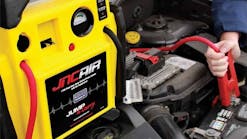Lessening the effects of the driver shortage on the aftermarket supply chain
Although the driver shortage has been the focal point of much attention within the transportation and logistics sector, companies across the board are more keenly experiencing the fallout arising from the issue as it affects different elements of the economy. In recent years, the driver shortage has begun to directly impact industries which are more dependent upon prompt transportation services, and the automotive supply chain is unlikely to remain exempt from these trends. The automotive aftermarket industry—a $380 billion dollar industry in the U.S.— is forecasted to globally exceed the trillion dollar threshold by 2022, which makes the accompanying need for reliable and efficient transportation solutions ever more critical. With higher demand for goods and tighter transportation capacity, both sectors must together find a way to get more drivers on the road to bolster the supply chain.
Severity of the driver shortage
While the ramifications of the driver shortage are wide-reaching and extend to numerous sectors of the economy, carriers and shippers are undoubtedly being hit the hardest. According to data collected by the American Trucking Association (ATA), the driver shortage has been dramatically increasing since 2011, when the full truckload for-hire turnover rates exceeded 80 percent. At the end of 2017, the trucking industry was short 51,000 drivers – which is up from a shortage of 36,000 drivers in 2016. Even with transportation companies implementing new programs and campaigns to attract and retain drivers, the ATA anticipates greater increases in driver shortage numbers in years to come.
The driver shortage impact on the automotive industry
The automotive industry is on solid footing with a thriving economy contributing to increased consumer spending. However, with the increased demand for goods comes increased strain upon the modes of transportation which permit delivery to the end consumer. Transportation and logistics providers partnering with manufacturers and vendors in the automobile industry confront some of the most complex logistics problems one can face. With over 20,000 parts from thousands of different suppliers, it can be challenging to maintain visibility on the innumerable number of parts moving throughout the supply chain. Couple this with other specialized requirements which are often necessary, such as unattended overnight delivery, and it is easy to understand why efficiency is of the utmost importance within the automotive aftermarket sector. Reduced trucking capacity only serves to disrupt the precise execution and flow of goods within the automotive supply chain, ultimately creating a financial and strategic burden adversely impacting the industry as a whole.
Ways to overcome the driver shortage
The good news is that there are solutions to proactively counteract the driver shortage. Some transportation and logistics companies are mitigating this problem by offering drivers pay raises, signing bonuses and shorter hours where feasible. When looking for a partnership with a shipping provider, automotive industry professionals should seek a company that implements long-term solutions for attracting and retaining drivers, such as:
- Driver apprenticeship programs focused on high school students which accelerate recent graduates along the path to obtaining their CDL.
- Dock-to-Driver programs allowing employees to progress from performing dock operations to a non-CDL driver, followed by enrollment in a Class A CDL training program.
- Truck driving academies, certified by the Professional Truck Driving Institute, which pay employees their wages during the program and upon successful completion guarantee them employment with the company.
In addition to seeking a transportation partner with long-term recruitment, training and development plans in place to grow its driver numbers, those in the automotive industry should also seek a provider offering exclusively-engineered solutions and services capable of improving the efficiency of their supply chains. Some of the solutions the transportation partner should provide include:
- Engineered Solutions – Perhaps the most important trait to look for in a logistics provider is one who can deliver a comprehensive evaluation of current transportation supply chains and tailor a custom solution to alleviate long term driver staffing issues.
- Tracking – Select a company that is equipped with the latest shipment tracking technology, so any delays or detention can be immediately communicated to the customer.
- Bundled services – Look for a logistics company that can also warehouse and distribute manufactured goods to add control and velocity to your entire supply chain.
- Dedicated Fleets – Consider a transportation and logistics company that offers multiple modes of transportation including Contract Dedicated, LTL, Drayage and other transportation solutions tailored to meet customer specific needs.
As the driver shortage persists within the transportation and logistics industry, this nationwide problem will continue to have a widespread impact on all sectors of the economy. Like other industries, the automotive sector is greatly dependent upon logistics partners to achieve success. By seeking out a logistics partner focused on meeting customer needs and
implementing creative solutions to the driver shortage, businesses within the automotive sector can gain more stability and security while better positioning themselves for success.


